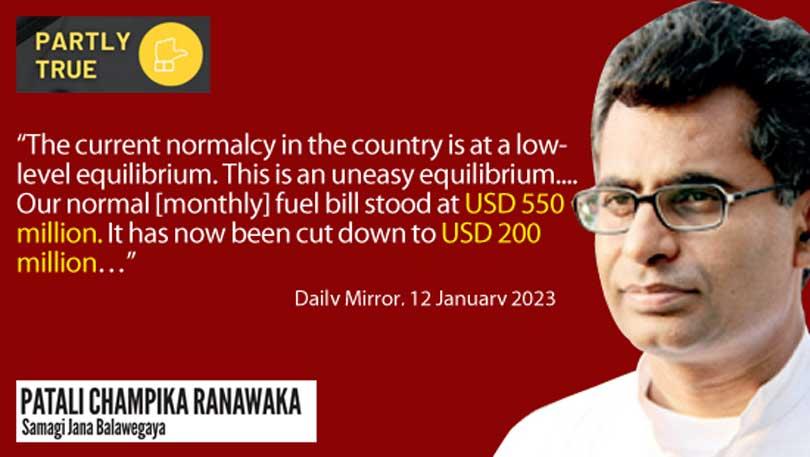11 Feb 2023 - {{hitsCtrl.values.hits}}

 In an exclusive interview with the Daily Mirror, the MP cites the reduction in the monthly fuel bill as an example of why Sri Lanka’s current economic “normalcy” is on an “uneasy equilibrium”. In his example, he says that the country is saving around USD 350 million a month by cutting down the fuel bill from around USD 550 million to USD 200 million a month. Suggesting that the equilibrium the MP deems unsustainable is that of the balance of inflow and outflow of foreign currency.
In an exclusive interview with the Daily Mirror, the MP cites the reduction in the monthly fuel bill as an example of why Sri Lanka’s current economic “normalcy” is on an “uneasy equilibrium”. In his example, he says that the country is saving around USD 350 million a month by cutting down the fuel bill from around USD 550 million to USD 200 million a month. Suggesting that the equilibrium the MP deems unsustainable is that of the balance of inflow and outflow of foreign currency.
To evaluate the above claim, FactCheck.lk consulted the weekly economic indicators, monthly import expenditure and sales of petroleum products published by the Central Bank of Sri Lanka (CBSL).
On the USD 550 million, Sri Lanka’s monthly import data reports show that it has only once spent over that amount on fuel. This was in November 2012, when the monthly fuel bill is reported as USD 581 million.
On the USD 200 million, the reported monthly fuel bill has been close to this only in one out of the last 12 months, with the last 6-month average being USD 355 million and the last 3-month average being USD 398 million.
To check the MP’s claim of savings made on a “normal fuel bill”, the monthly average fuel import expenditure was compared between 2019 (pre-Covid 19, and before the current economic crisis period), and 2022 (up to November). The data shows the value of the monthly average fuel imports as having risen by USD 86 million between these periods. Therefore, the MP's figures, in his example of the savings made on foreign currency outflows for fuel, are contrary in every respect to the published official data.
To check the MP’s broader claim on the “uneasy equilibrium” of net currency inflows/outflows as connected to fuel imports, FactCheck.lk also consulted CBSL data on the quantity of petroleum- related products imported and sold. Contrasting the 2019 and 2022 import and sales quantities show that sales of petroleum products in 2019 and 2022 have fallen by 31%, 13%, and 10% for kerosene, petrol, and diesel respectively; and a reduction of crude oil by 44%. This suggests, that despite the import values not reducing as claimed, the currency inflow/outflow equilibrium is dependent on the unusual and enforced contraction in demand in the petroleum sector (with fuel quotas and power cuts).
Overall, the MP is quite incorrect in the supporting numbers and example he provides. But he could have supported his larger point of an uneasy equilibrium in the balance of foreign currency inflows/outflows, had he referred to the quantity of imports/sales rather than the cost of the same.
Therefore, we classify his statement as PARTLY TRUE.
*FactCheck.lk’s verdict is based on the most recent information that is publicly accessible. As with every fact check, if new information becomes available, FactCheck.lk will revisit the assessment.
FactCheck is a platform run by Verité Research.
For comments, suggestions and feedback, please visit www.factcheck.lk.
04 Jan 2025 7 hours ago
04 Jan 2025 7 hours ago
04 Jan 2025 8 hours ago
04 Jan 2025 04 Jan 2025
04 Jan 2025 04 Jan 2025